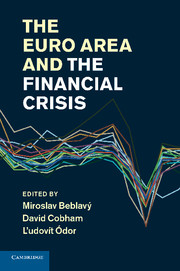Book contents
- Frontmatter
- Contents
- Figures
- Tables
- Boxes
- Contributors
- Abbreviations and acronyms
- 1 Introduction
- 2 Towards a new architecture for financial stability in Europe
- Part I The experience of the crisis
- 3 Weathering the financial storm: the importance of fundamentals and flexibility
- 4 The Irish crisis
- 5 The crisis in Spain: origins and developments
- 6 The financial crisis and the Baltic countries
- Part II Accession to the euro area
- Part III The future of the euro area
- Index
- References
4 - The Irish crisis
from Part I - The experience of the crisis
Published online by Cambridge University Press: 07 October 2011
- Frontmatter
- Contents
- Figures
- Tables
- Boxes
- Contributors
- Abbreviations and acronyms
- 1 Introduction
- 2 Towards a new architecture for financial stability in Europe
- Part I The experience of the crisis
- 3 Weathering the financial storm: the importance of fundamentals and flexibility
- 4 The Irish crisis
- 5 The crisis in Spain: origins and developments
- 6 The financial crisis and the Baltic countries
- Part II Accession to the euro area
- Part III The future of the euro area
- Index
- References
Summary
Introduction
Ireland is in the midst of a severe crisis. While the global financial crisis has affected all economies to varying degrees, it has been especially severe in Ireland with a cumulative nominal GDP decline of 21 per cent from 2007Q4 to 2010Q3. This ranks Ireland among the worst-affected countries in terms of output performance during this period (Lane and Milesi-Ferretti, 2011).
Allied to this economic shock, Ireland has also experienced a severe fiscal deterioration. After a long period of running surpluses, the fiscal balance shifted from positive territory in 2007 to baseline deficits of 11–12 per cent of GDP in 2009 and 2010. Much of this fiscal deficit is structural in nature, such that the resumption of economic growth on its own is not sufficient to restore fiscal sustainability. In addition, the one-off cost of recapitalising the banking system pushed the overall general government deficit to 14.5 per cent of GDP in 2009 and 32 per cent of GDP in 2010, leading to rapid growth in the overall level of public debt.
- Type
- Chapter
- Information
- The Euro Area and the Financial Crisis , pp. 59 - 80Publisher: Cambridge University PressPrint publication year: 2011
References
- 23
- Cited by



